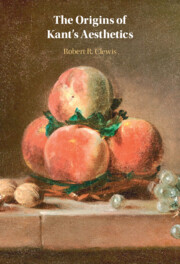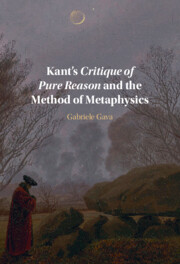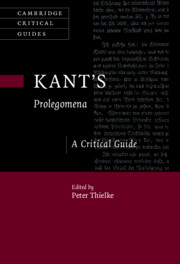The Origins of Kant's Aesthetics
£75.00
- Author: Robert R. Clewis, Gwynedd Mercy University, Pennsylvania
- Date Published: January 2023
- availability: Available
- format: Hardback
- isbn: 9781009209427
£
75.00
Hardback
Other available formats:
Paperback, eBook
Looking for an inspection copy?
This title is not currently available on inspection
-
Organized around eight themes central to aesthetic theory today, this book examines the sources and development of Kant's aesthetics by mining his publications, correspondence, handwritten notes, and university lectures. Each chapter explores one of eight themes: aesthetic judgment and normativity, formal beauty, partly conceptual beauty, artistic creativity or genius, the fine arts, the sublime, ugliness and disgust, and humor. Robert R. Clewis considers how Kant's thought was shaped by authors such as Christian Wolff, Alexander Baumgarten, Georg Meier, Moses Mendelssohn, Johann Sulzer, Johann Herder, Francis Hutcheson, David Hume, Edmund Burke, Henry Home, Charles Batteux, Jean-Jacques Rousseau, and Voltaire. His resulting study uncovers and illuminates the complex development of Kant's aesthetic theory and will be useful to advanced students and scholars in fields across the humanities and studies of the arts.
Read more- Examines the development of Kant's aesthetics in light of eight core themes in aesthetics and philosophy of art
- Analyses new sources and texts as they have become more available in recent years
- Makes use of the publication of the lectures on anthropology (in German) in 1997 and their translation (into English) in 2012
Reviews & endorsements
'… a dense history of aesthetics and a close reading of Kant's philosophy at the same time - which makes it interesting to scholars who are quite familiar with Kant's predecessors and contemporaries as well as with the work of scholars who specialise on Kant. However, it might prove to be a compass to young scholars as well who are beginning to navigate Kant's philosophy. … Clewis's monograph needs to be read for its innovative practice of turning a work of art theory into a text in itself that needs to be supplemented with a number of other sources rather than being taken for granted.' Soni Wadhwa, Journal of Comparative Literature and Aesthetics
Customer reviews
Not yet reviewed
Be the first to review
Review was not posted due to profanity
×Product details
- Date Published: January 2023
- format: Hardback
- isbn: 9781009209427
- length: 288 pages
- dimensions: 235 x 158 x 21 mm
- weight: 0.55kg
- availability: Available
Table of Contents
Introduction
Part I. Aesthetic Judgment and Beauty:
1. On Rules of Taste
2. Beauty Free
3. Beauty Grounded
Part II. Genius and the Fine Arts:
4. Genius, Thick and Thin
5. Classifying the Fine Arts
Part III. Negative and Positive States:
6. Meet the Sublime Now: It's a Negative Pleasure
7. Ugliness and Disgust: Disagreeable Sensations
8 Playing with Humor
Closing Reflections.
Sorry, this resource is locked
Please register or sign in to request access. If you are having problems accessing these resources please email [email protected]
Register Sign in» Proceed
You are now leaving the Cambridge University Press website. Your eBook purchase and download will be completed by our partner www.ebooks.com. Please see the permission section of the www.ebooks.com catalogue page for details of the print & copy limits on our eBooks.
Continue ×Are you sure you want to delete your account?
This cannot be undone.
Thank you for your feedback which will help us improve our service.
If you requested a response, we will make sure to get back to you shortly.
×






